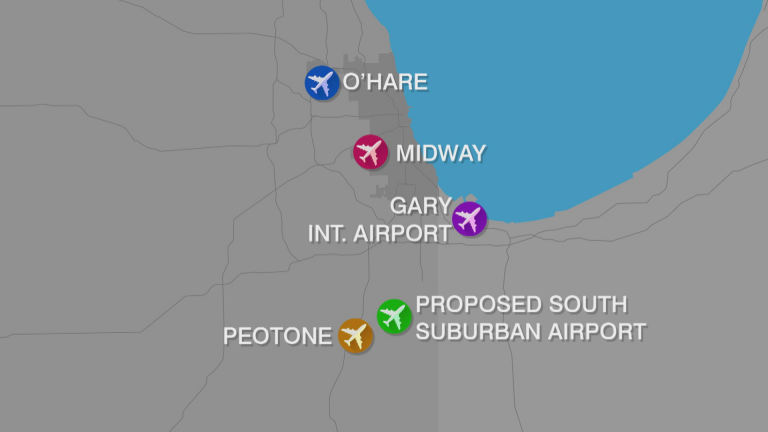As the old saying goes: If at first you don’t succeed, try, try again.
Local officials in the south suburbs are putting that maxim into practice, with renewed efforts to get a regional airport to take flight.
The idea for a third Chicago area airport has been floated for decades, and not lightly — Illinois has spent close to $100 million to buy land that could host a south suburban airport.
“I’m wearing a lapel pin that says Airport 2000. This was an initiative 30 years ago. We’ve waited long enough,” state Sen. Patrick Joyce, D-Essex, said Monday at a media conference hosted by advocates working to land the metaphorical plane.
There’s some renewed momentum on their side.
An Illinois House committee this month easily passed a measure (HB2531) that would require the state transportation department to proactively seek out developers with the interest and potential of building out the state’s land into a cargo airport within six months of the proposal becoming law.
“This will be a different kind of airport, built to serve industry. Built to serve cargo carriers. Built for e-commerce and logistics, and our modern economies,” said state Rep. Debbie Meyers-Martin, D-Olympia Fields.
At an unrelated press conference March 8, Gov. J.B. Pritzker signaled caution, noting that despite spending $97 million to buy about 90% of the land needed, the state would still have to procure the final 10%.
He also said he wanted to be sure that cargo carriers would use the airport before he could fully get behind the concept.
“What you don’t want is: If you build it, they will come. Just building the thing and hoping that people will show up to essentially pay for the airport having been built,” Pritzker said. “You need to be sure that you’re building it because you have interest from cargo carriers who are committing to make that a cargo airport.”
The legislation sponsored by state Rep. Will Davis, D-Hazel Crest, would force the state to find the answers to Pritzker’s questions by requiring IDOT begin a prequalification process. Or as Davis described it, an opportunity for “developers who are interested in building the airport to put pen to paper so they can show their capacity, their desire, their willingness, and their money to be able to build our third airport.”
Davis said he’s using the tools available to him as a state lawmaker to get the ball rolling.
If Davis’ plan does advance, critics expect little to come of it.
While much has changed in the 20 years since the Environmental Law and Policy Center’s deputy director Kevin Brubaker began fighting a south suburban airport, there’s been one constant: It’s a solution in search of a problem, he said.
“It was first proposed as a solution to the fact that we couldn’t expand O’Hare Airport. Well, then we expanded O’Hare Airport. Then they decided we needed a new passenger facility for the south suburbs, but the airlines showed zero interest in it,” he said. “So now it’s purportedly a solution to our air cargo problems. But we don’t have air cargo problems. We have O’Hare, we have Rockford, we have Gary. There’s lots of air cargo capacity already in the Chicago area.”
From an environmental perspective, Brubaker said the airport would pose hazards for the fragile habitat of the nearby Midewin National Tallgrass Prairie, and that it makes no sense to expand water, roads, electricity and all the things needed to create a commercial center, to what he called the “middle of nowhere.”
“This is an area where we shouldn’t be promoting sprawl. The region should be concentrating its growth and its job creations in closer to the core where it can support the existing tax base, provide jobs for people who already are in that area, instead of building new facilities out in the middle of nowhere, in farmlands,” Brubaker said.
Will County Board Chair Judy Ogalla, a Republican, said she lives and runs a farm “smack dab” in the farmlands where the airport would reside.
She said the airport would disrupt what should be the priority in the future: sustainable agriculture.
Ogalla called the push for the Peotone airport a “dog and pony show” opposed by residents.
“My general reason for position is that this has been going on for decades. There has never been any interest in it aside from political,” Ogalla said. “I feel that this is a waste of tax dollars, and that we should instead be spending those tax dollar to create jobs” in communities like Chicago Heights and Harvard.
But backers, including the South Suburban Mayors and Managers Association, trade unions, Black Contractors, Owners and Executives and the South Suburban Action Conference, said the project would benefit residents, including with protections for contractors of color.
“The new companies will pay property taxes to fund our local schools, municipalities and services, much like O’Hare does in the northwest suburbs. Additionally, this airport will help reshoring jobs back to America and retain jobs in Illinois,” said Southland Chamber of Commerce Chair Bonita Parker.
Parker said a south suburban airport would create more 10,000 construction jobs over three years, and that the cargo airport would create 50,000 “direct, indirect and induced job” once it opens.
Follow Amanda Vinicky on Twitter: @AmandaVinicky



